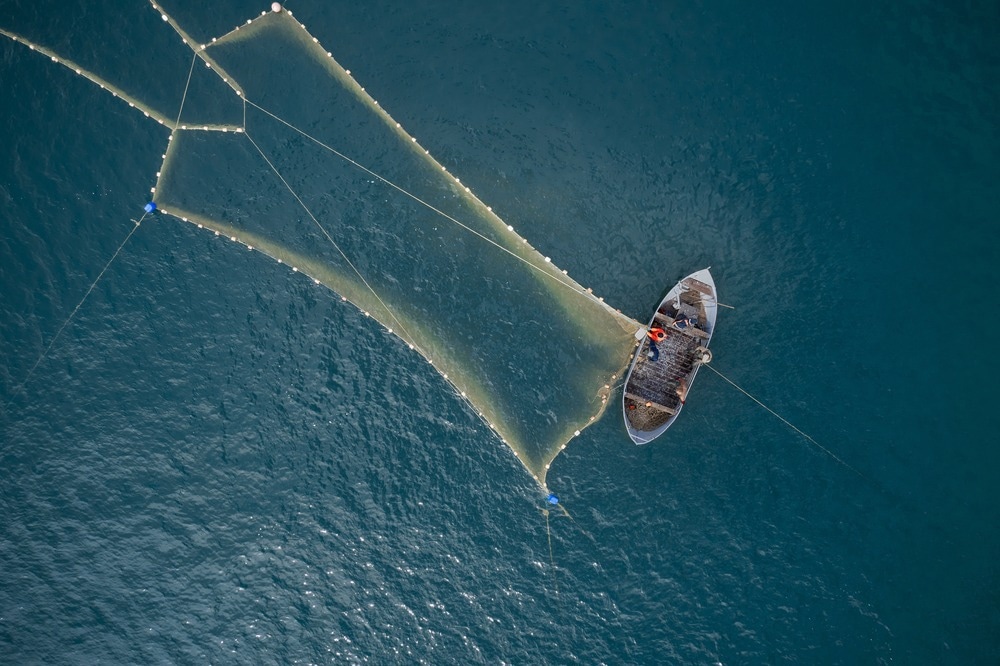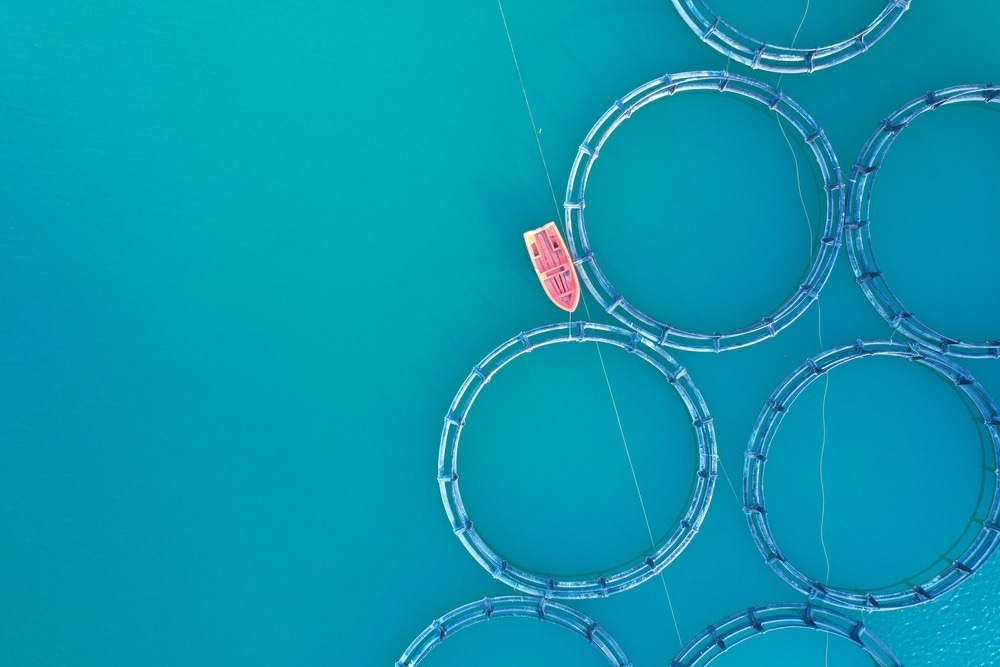Global food production is under pressure from growing food demand associated with population growth. In turn, food policies have turned towards blue economies relying more on aquaculture to compensate for diminishing agricultural productivity. However, the seafood industry faces challenges ranging from resource overexploitation to illegal fishing and ineffective policies.

Image Credit:
The overexploitation of resources across seafood sectors
The seafood industry typically refers to fishing and aquaculture sectors across freshwater, marine, and brackish systems under recreational and commercial efforts. Around the world, seafood represents an industry worth over 330 billion USD, with fish being the most consumed animal protein and China being the country with the largest seafood industry. However, despite the growth of seafood sectors projected to increase, gradually diminishing resource availability is slowing estimates for the near future.
For fisheries, stocks are declining by an estimated 1.2 million tonnes, and 31% of marine fish species are already identified as overfished, according to the FAO in 2016. Not only does this directly impact ecosystems, which lose key species diversity and richness, and affects consumers that no longer have a source of protein. It would also eliminate job opportunities for the 56.6 million people employed in the fisheries and aquaculture sector.
Reductions in fish stocks can also be associated with illegal fishing, exacerbating fishing prospects for the seafood industry. An estimated 20% of the annual global fish catch is caught illegally. Illegal fishing refers to illegitimate, unreported, and unregulated fishing in illegal areas, such as protected zones or foreign water, or targeting protected species. The impacts of illegal fishing were reviewed in a case study by Sherman et al. (2018), who examined how policies and management strategies can limit such practices and improve economic and food security.
The instability caused by declining fishery stocks is alarming, yet more protein is required to feed a growing human population. As a result of the growing food demand, aquaculture has become a primary source of interest. The expansion of aquacultural activities has rapidly accelerated in time and space worldwide but primarily in South East Asia, where shrimp farms dominate vast expanses of coastal aquacultures in China.
According to Naylor et al. (2021), farmed fish and shellfish production alone has tripled from 1997 to 2017. Although this has often been portrayed as reducing pressure on wild fisheries, aquaculture has generated numerous ecological impacts ranging from the spread of invasive species to the proliferation of diseases and algal blooms. Nevertheless, aquaculture is set to remain the fastest-expanding sector and now faces limitations related to ecosystem suitability and ecological instability as a result of nutrient runoff.
Global climate change challenging the future of the seafood industry
The drastic increase in greenhouse gas emissions over the last century has resulted in the warming (increased temperature), acidification (reduced pH), and hypoxification (reduction in oxygen availability) of the oceans around the world. These effects are already impacting fish stocks and fishers. For instance, fish are moving towards the poles to escape warm and unsuitable habitats, and the empty spaces left behind have no resources for fishermen to catch.
Impacts on fish populations also include faster growth rates and smaller body sizes, which reduces overall biomass catch as a result. Other effects of climate change also include an increase in the invasions of alien species and an increase in disease proliferation, demonstrating how climate change is leading to a reshuffling of ecosystems on a global level.
The severity and range of impacts of climate change on fisheries were reviewed in 2020 by Mendenhall et al. Authors discuss how the consequences of climate change will increase fisheries-related conflicts due to resource grabbing as climate change has implications for inter-state and regional interactions, such that conflict may occur on multiple scales simultaneously. The review advocates for multinational response policies and reforms governing maritime territorial claims and marine protected areas.
The humanitarian element of global climate change is often considered after the economic dimensions, yet the changes induced by global climate change are already impacting fishers and their communities in Africa and South East Asia socially and economically. These regions are expected to be some of the most affected by the impacts of climate change yet depend on the most on aquaculture and seafood. As a result, socioeconomic challenges are emerging rapidly will little adaptive capacity.

Image Credit: sercandulger/Shutterstock.com
Addressing the challenges facing the seafood industry
The modern seafood industry is equipped with unprecedented technological tools, financial support, and international investment. In a 2022 review by Hallerman et al., authors discuss the value of aquacultural advancements in technical understanding and tools. The researchers argue that improving aquacultural conditions and productivity remains a technical challenge and that continuing the sector's growth will depend on developing better feeds and monitoring systems and improving our understanding of biology and ecology.
Similar conclusions were reached in a 2004 review by Peterman, who examined the main challenges and solutions facing aquaculture. Specifically, the author presents the four main issues in aquacultural productivity: dealing with pervasive risks, estimating uncertainty, evaluating performance, and community technical issues. The author then offers solutions to each challenge, including developing risk assessment analyses to inform decision-making, designing hierarchical models to improve the estimation accuracy of stocks, using operating models of whole fishery systems, and using knowledge from other fields of science, such as cognitive psychology to improve communication among scientists, managers, and stakeholders.
However, these solutions address technical challenges under the assumption that most fisheries, fishes, and fishers will be able to survive and remain productive in their environments despite rapid environmental changes, increased fishing pressure, and unpredictable socioeconomic prospects. Therefore, major policy shifts as directed by the Sustainable Goals (SDGs) developed in 2015 by the United Nations may have greater success in mitigating the effects of global change and overfishing, yet the adaptive capacity of fishers is uncertain. The future of the seafood sector is exciting as innovations in technologies and understanding may revolutionize the scale of aquacultural production, yet challenges may undermine the industry's growth if they remain overlooked.
Continue Reading: Illegal Fishing and Its Impacts on Conservation and Fisheries
Sources:
- Hallerman, E., Esteban, M. A., & Baldisserotto, B. (2022). Current Advances and Challenges in Fisheries and Aquaculture Science. Fishes, 7(2), 87. https://doi.org/10.3390/fishes7020087
- Mendenhall, E., Hendrix, C., Nyman, E., Roberts, P. M., Hoopes, J. R., Watson, J. R., Lam, V. W., & Sumaila, U. R. (2020). Climate change increases the risk of fisheries conflict. Marine Policy, 117, 103954. https://doi.org/10.1016/j.marpol.2020.103954
- Peterman, R. M. (2004). Possible solutions to some challenges facing fisheries scientists and managers. ICES Journal of Marine Science, 61(8), 1331–1343. https://doi.org/10.1016/j.icesjms.2004.08.017
- Sherman, K. D., Shultz, A. D., Dahlgren, C. P., Thomas, C., Brooks, E., Brooks, A., Brumbaugh, D. R., Gittens, L., & Murchie, K. J. (2018). Contemporary and emerging fisheries in The Bahamas-Conservation and management challenges, achievements and future directions. Fisheries Management and Ecology, 25(5), 319–331. https://doi.org/10.1111/fme.12299
Further Reading
Last Updated: Dec 29, 2022